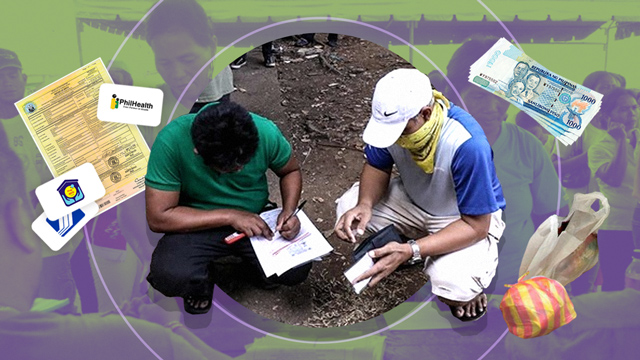

It has been almost a month since the government imposed a Luzon-wide enhanced community quarantine which forced many daily wage workers to stop working and to stay at home to prevent the spread of the coronavirus. But of the planned P200 billion emergency subsidy program which aims to give P5,000 to P8,000 in aid to 18 million of the poorest households in the Philippines, only P16 billion has been sent to 3.7 million households, according to the President’s most recent report.
These initial households are members of the Pantawid Pamilyang Pilipino Program (4Ps), the country's conditional cash transfer program. Hard as it may be to implement a cash transfer program in the time of physical distancing, sending money to 4Ps households is the easier part of this operation. These families already have verified identities and bank accounts where the cash can be deposited directly.
The other 14 million households will be much harder to reach. Right now, only around half a million drivers, formal workers, informal workers, and farmers have been served by the other social amelioration programs. These running numbers are in the COVID19 Citizens' Budget Tracker.
To spend faster to stop hunger, we should remove the requirement for non-Pantawid households to present identification (ID) cards. For them to get the subsidy, it should be enough that they either be identified by their local leaders or that they fill out their social amelioration cards.
Why? Our approach to this unfolding humanitarian emergency should be: pay now, verify later.
The current ID requirement makes it hard, if not impossible, to give aid to the families of the 5 to 7.5 million poorest Filipinos who do not have birth certificates, a primary document required for many "valid" IDs required by the emergency subsidy program. This estimate comes from the Philippine Statistics Authority and the Child Rights Network. The World Bank Group and UNICEF estimate that the completeness of registration among children under the age of 5 in the Philippines was just at 91.8 percent as of 2017. It was 90.2 percent in 2010 and was probably even lower before this. That many people do not officially exist in government records is called the scandal of invisibility.
Cost, conflict, consequences
In our recently published working paper, “Everyone Should Count: Barriers and Opportunities for Birth Registration in the Philippines,” we find that the poor face many barriers to getting a birth certificate. (READ: 5 million have no birth records)
These barriers can be summarized using three-Cs: cost, conflict, and the unintended consequences of penalizing childbirth at home.
- First, cost: delayed birth registration can cost anywhere from P1,700 to P3,500, three to 7 days' worth of earnings for a minimum wage worker. We find that the cost of the birth certificate itself is less than a tenth of this cost. A large chunk of the expenses are legal and transport costs from the many different documents required by local civil registries. These hidden costs make birth certificates a luxury for the poor.
- Second, conflict: in our interviews with church and social workers, we find that some parents choose not to register children born out of wedlock to prevent their spouses from finding out about their other partner. People in areas with violent conflict may also not trust the authorities with their data.
- Third, unintended consequences of government policy: we find that local governments have penalized midwives and mothers for giving birth at home, thinking this would encourage births in hospitals and health care centers. But this leads parents and midwives to avoid registering children to avoid incurring costs and penalties. In some municipalities, birth attendants or the kumadrona or hilot may be fined a minimum of P1,000.00 or be imprisoned for 3 to 6 months. In other areas, mothers themselves may be fined a minimum of P1,000.00. These policies disregard the plight of pregnant women who live in islands and mountains, who may be hours away from the nearest health care center and who would choose to stay at home with their midwife than give birth along the road.
How is this related to our coronavirus response and emergency subsidy program? Our research illustrates 3 things:
- First, a birth certificate is an essential requirement for many “valid” IDs required to get an emergency subsidy. Birth certificates are also needed to claim our right to vote, to study, to travel and work abroad, to drive, to work as a professional, to wed in a civil court, and to claim other social welfare benefits. A person who does not have a birth certificate is deprived of her voice, her identity, and her fighting chance to fend off hunger and move out of poverty.
- Second, even with the planned rollout of the National ID program, we are likely to exclude those who do not have birth certificates. As we implement the national ID system, we should put the poor at the front and center of our empathy; we should be mindful of the high legal, economic, and political barriers they face just to get birth certificates and other official government documents.
- Third, and most important, our research illustrates that documents we think are easy to get are out of reach for many of our poorest brothers and sisters, who are normally excluded from political processes. We should think the same way about the ID requirement and the other documentary requirements for the whole coronavirus social amelioration and economic recovery programs.
Current requirements
In the current rules, IDs are required for senior citizens, persons with disability, pregnant and lactating women, solo parents, overseas Filipinos in distress, workers in the informal sector, employers, and rice farmers.
Formal barangay certifications are required for underprivileged sectors, homeless families, indigent indigenous peoples, and other vulnerable groups. This makes it hard for families without IDs or political connections with barangay leaders to get the subsidy and to stave off hunger.
We understand that government officials need these requirements to verify the validity of the cash transfer. The documents provide government officials legal cover against future audit findings that may cost them their jobs. We understand that government has the unenviable job of making sure that the money: (a) goes only to poor households, (b) does not go to non-poor households, and (c) is not pocketed by corrupt officials.
In the literature on cash transfer programming, this is called the tradeoff between leakage and undercoverage. Policymakers need to balance precision with coverage and speed.
But there is another way to put systems of transparency and accountability while ensuring the speedy delivery of the cash: by publishing the list of names and the amount each beneficiary received.
Community audit process
Local government leaders, civil society organizations, and ordinary citizens can then take part in a community audit process where everyone can check if there are false names or benefit claims.
With a published list, we ourselves can check if we or our neighbors got a transfer or if our local officials do not give what is due to us. With a proper grievance procedure, we can help make ourselves accountable. Making this list and the computation of the allocations transparent can also prevent accusations of corruption among those who distribute the funds.
We join the call by the Stop COVID19 Coalition to publish the list of beneficiaries and the amount each person received.
Publishing this list is consistent with laws promoting ease of doing business and policies campaigning against red tape. It is also consistent with our privacy laws: Section 4(c) of the Data Privacy Act excludes from its scope "Information relating to any discretionary benefit of a financial nature such as the granting of a license or permit given by the government to an individual, including the name of the individual and the exact nature of the benefit."
In short, our privacy laws do not cover the emergency subsidy program’s beneficiary list and the planned and actual amount of the transfers. If social welfare officials are still wary about this, we ask that the National Privacy Commission give an opinion saying these specific data fields are out of their scope.
Hunger is real
Hardworking fathers and mothers who cannot work and get their families' daily bread say that hunger is more real to them than the coronavirus. Consider this story, reported by the Washington Post, of Jamaica Rivera, a young mother who lives in Rizal:
In her small and tightly packed community, almost everyone had lost their jobs to the lockdown. Rivera rents one of at least 20 makeshift houses on an unoccupied plot of land. She said that her family was unable to claim assistance from the local government because they did not have a residence ID.
“Is limiting [help] to people with IDs right?” said Rivera. “What about those who don’t have it? We don’t know how to register.”
“Nobody will give us help,” she added. “The only help we got was from the last election: bread that had almost expired.”
We should listen to Jamaica’s voice. Under current rules, people like her will not get the support they need to buy food and stop hunger.
No proof needed
The poor should not have to prove their identities when the state cannot even give them a birth certificate. For far too long, we have pushed the burden of proof on poor families. We should shift some of the burden of proof to elected local leaders who distribute the funds and to all of us to provide the necessary checks and balances to have a swift transfer of funds.
This, we believe, is one way we can show malasakit or solidarity with our poorest brothers and sisters. Many of them are already burdened by poverty; we should stand with them and help them lighten their yoke.
In this emerging humanitarian crisis where hunger is as much as problem as the coronavirus itself, we should err on the side of speed and generosity, for it is here that that we can also err on the side of justice. – Rappler.com
Kenneth Isaiah Ibasco Abante graduated with a Master in Public Administration in International Development from Harvard Kennedy School in 2019. He is research faculty at the Department of Interdisciplinary Studies at the School of Humanities of Ateneo de Manila University. His research page is here. For comments, you may email him via kabante@ateneo.edu. Jeshamar C. Villasis graduated with a Master in Public Administration from the University of the Philippines National College of Public Administration and Governance. She is an instructor at the Department of Political Science of the Faculty of Arts and Letters of the University of Santo Tomas. Her research page is here. For comments, you may email her via jctvillasis@ust.edu.ph. Ken and Jesha’s research on birth registration can be accessed via bit.ly/EveryoneShouldCount.
The authors thank former social welfare secretary Corazon Soliman and former social welfare staffers Ayen Lopez and Ana Raymundo for their comments, as well as Leo Camacho for his legal advice, Jim Lopa and Rapa Lopa for allowing us to work on this research as part of WeSolve, Anette Balaoing for helping us gather data on the costs of birth registration, and Regine Cabato, for allowing us to reprint part of her coronavirus coverage from the Washington Post. “Everyone Should Count: Barriers and Opportunities for Birth Registration in the Philippines” was funded and commissioned by WeSolve Inc, a firm that forms and sustains partnerships to achieve the sustainable development goals.